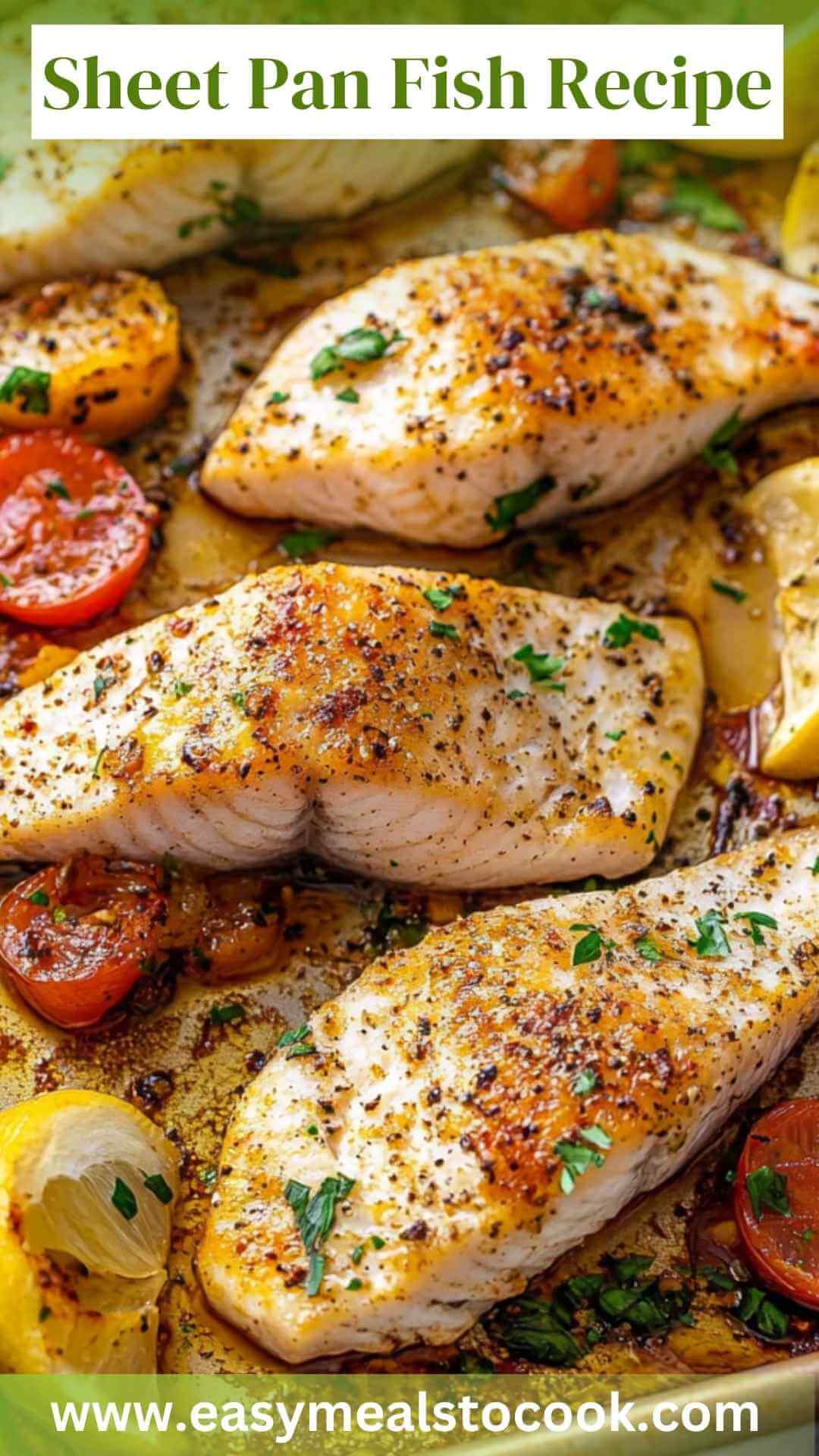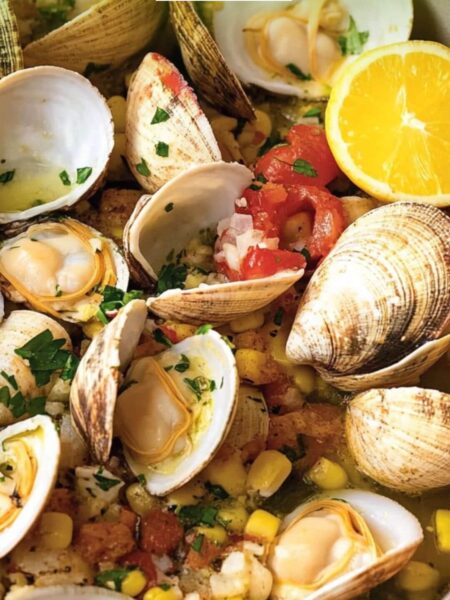When you think of shrimp étouffée, what comes to mind? Perhaps you picture a cozy kitchen, a pot bubbling with rich flavors, and the aroma wafting through the air, teasing the senses. This dish represents more than a meal; it’s a celebration of culture, tradition, and warmth.
But before we dive into the details of making shrimp étouffée, let’s consider what pairs beautifully with it.Crusty Bread, Rice, Salad etc.
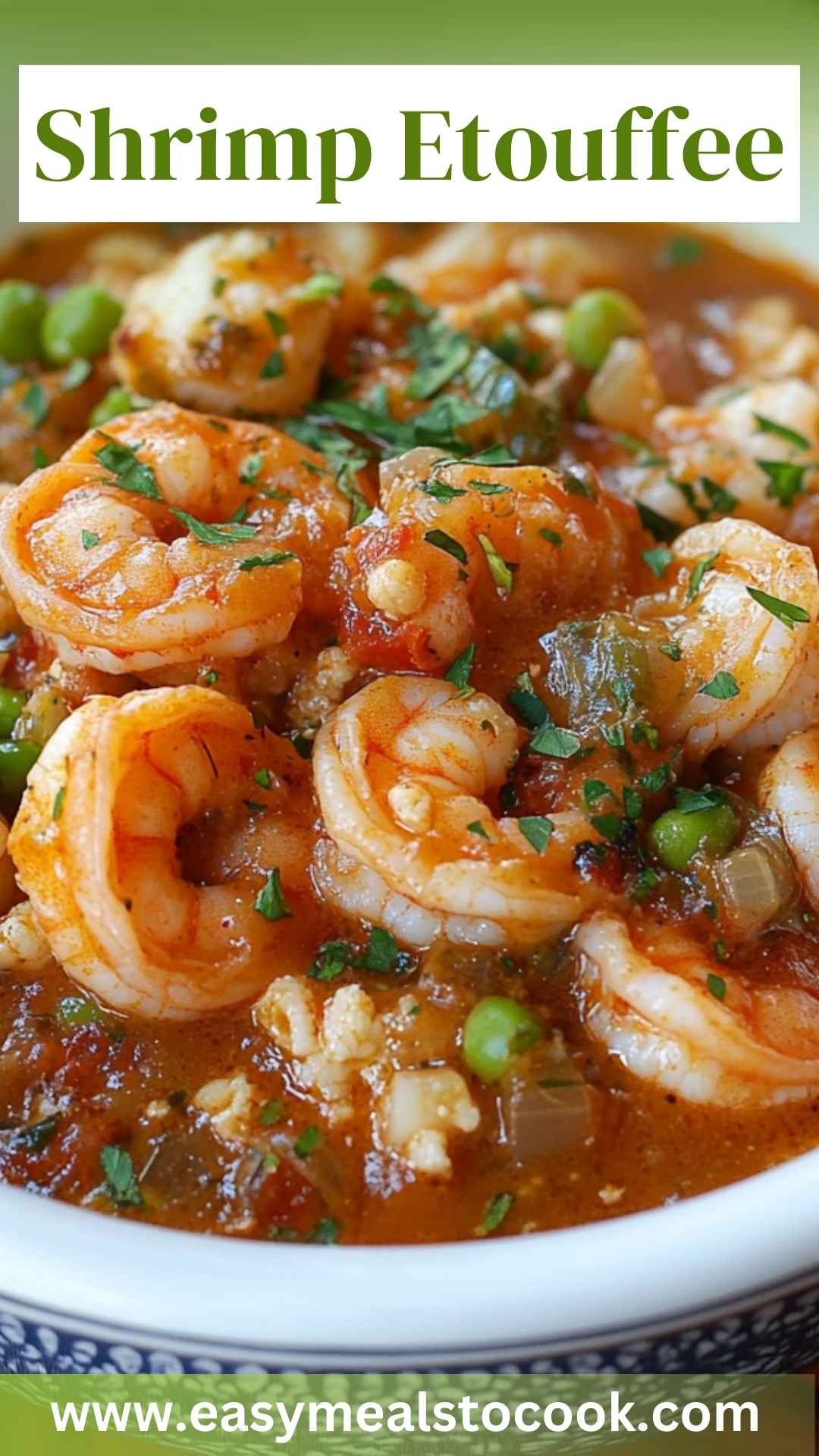
What is Shrimp Étouffée?
Shrimp étouffée is a luscious dish originating from Louisiana. “Étouffée” means “to smother,” which perfectly describes how the shrimp are enveloped in a flavorful roux-based sauce.
Traditional cooking hinges on a mix of vegetables known as the “holy trinity” – onions, celery, and bell peppers – with a mix of spices that give it character. This dish isn’t just a one-time wonder; it becomes richer the longer it sits, enhancing those robust flavors.
Why This Recipe Works
Creating a great shrimp étouffée hinges on a carefully developed roux. The rich, nutty flavor of a properly browned roux sets the foundation for the dish. Add the freshness of shrimp and the vibrant spices, and you have a balance of depth and brightness.
The use of shrimp stock, or even clam juice, fosters an oceanic essence that makes every bite sing. Trust me, the process becomes second nature once you get the hang of it.
What You’ll Need to Make This Dish
Before we roll up our sleeves, let’s gather the essentials:
For the optional shrimp stock
- 1 rib celery, diced
- Top and base ends of 1 green bell pepper
- 1/2 teaspoon black peppercorns
- 2 cloves garlic, smashed and chopped
- 5 dried bay leaves
- Shells from 2 pounds of fresh shrimp
- 1/2 large yellow onion, roughly chopped
For the étouffée
- 1/2 large sweet onion, chopped
- 1 pint homemade shrimp stock, bottled clam juice, or seafood stock
- 1 tablespoon sweet smoked paprika
- 1/4 heaping cup all-purpose flour
- Hot sauce like Crystal, Louisiana, or Tabasco, to taste
- 1/4 cup pure vegetable oil or rendered lard
- 3 green onions (scallions), sliced thinly
- 2 pounds large shrimp, peeled and deveined
- 1 tablespoon fresh parsley, finely chopped
- 1 to 2 jalapeño peppers, seeded and chopped
- 1 tablespoon authentic Cajun spice blend
- 4 cloves garlic, minced
- Salt, to taste
- 1 green bell pepper, diced
- 1/2 teaspoon celery seeds
- 1 large stalk celery, finely chopped
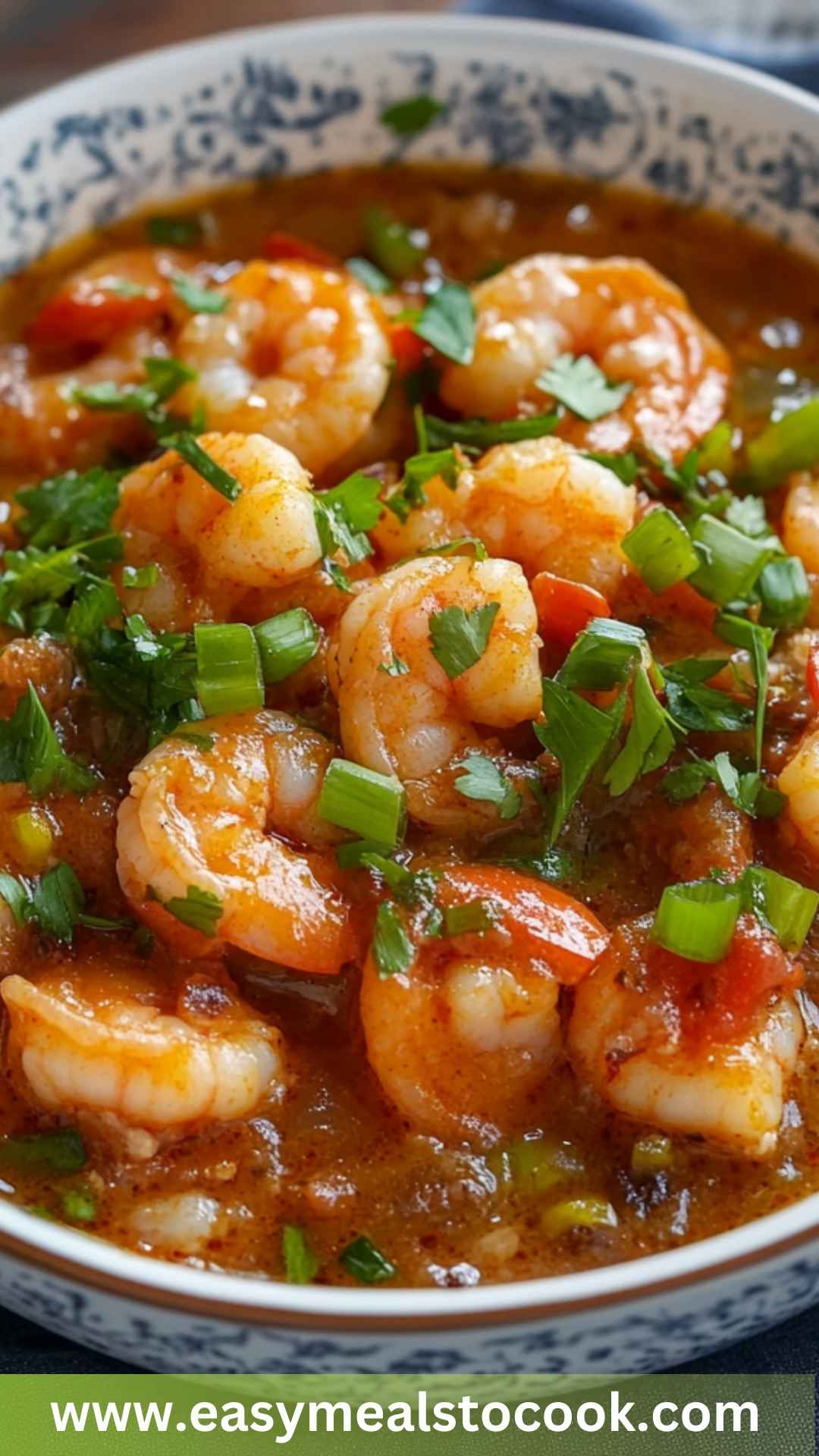
How to Make Shrimp Étouffée?
Let’s keep the excitement rolling! Here’s a brief preview of the steps. We will focus on the details shortly, but first, know that making shrimp étouffée involves peppering in flavor at each stage and letting that roux take center stage.
Step-by-Step Instructions
Step 1: Prepare the Shrimp Stock (Optional)
If you want every nuance packed into this dish, start with making your stock. In a pot, toss together the shrimp shells, chopped onion, diced celery, garlic, bell pepper tops, bay leaves, and black peppercorns.
Cover with water, bring to a boil, and simmer for about 30 minutes. Then strain the liquid, discarding solids. That’s your secret weapon for flavor in this dish.
Step 2: Create the Roux
In a heavy skillet, heat the oil or lard over medium heat. Gradually whisk in the flour. The goal is to stir continuously until the mixture turns a deep brown color, resembling chocolate.
Yes, the color matters; this step builds that rich flavor. It typically takes about 15-20 minutes, so keep whisking and set your timer. The smell will be nutty and inviting.
Step 3: Incorporate the Vegetables
Once the roux is ready, sprinkle in the chopped onions, bell pepper, and celery aka the holy trinity. Cook this mixture, stirring frequently for about 5-7 minutes. These veggies should become soft and aromatic.
Step 4: Add Garlic and Spice
Add the minced garlic, jalapeños, Cajun seasoning, and paprika into the mix. Stir for an additional two minutes, letting the garlic release its fragrance and the spices bloom. This is where you can really elevate the dish’s profile.
Step 5: Pour in Liquid
Now, whether you’re using the homemade shrimp stock or bottled clam juice, gradually whisk it into the skillet.
This will break up any clumps of roux and create the sauce you’ll want to revel in. Bring it to a boil before reducing the heat to a simmer. Let this cook gently for about 10-15 minutes, allowing it to thicken.
Step 6: Add the Shrimp
Once your sauce is bubbling and savory, it’s time for the stars of the show—the shrimp. Stir them in, making sure they’re well-coated with that spicy sauce.
Cook for just 5 minutes or until the shrimp are opaque and curled. (Overcooked shrimp are tough; you don’t want that!)
Step 7: Finish with Green Onions and Parsley
Remove the skillet from heat, then fold in the chopped parsley and green onions. Have a taste, and adjust salt and hot sauce according to your preference.
Tips for the Perfect Shrimp Étouffée
- Use Fresh Shrimp: The fresher, the better. Always opt for quality seafood. Check for firmness and a mild ocean scent.
- Control the Heat: Not everyone enjoys heat. Adjust the number of jalapeños based on your taste. Easy does it until you find that perfect level.
- Don’t Rush the Roux: Patience is key for a perfect roux. Color is everything, so keep that flame low and your whisk moving.
- Leftovers Love: Shrimp étouffée typically gets better the next day, as flavors meld together. Store in the fridge for a delightful leftover meal.
- Experiment with Spices: If you have your favorite spice blend, feel free to mix it in. Cajun seasoning adds the classic flavor, but personal touches can yield exciting results.
How to Store Leftovers?
Let the shrimp étouffée cool down to room temperature. Then transfer it to an airtight container and store it in the fridge for up to 3 days.
To reheat, simply warm it gently over low heat on the stovetop. You may want to add a splash of stock or water to loosen it up.
How Would I Recommend Serving Shrimp Étouffée?
1. On a Bed of White Rice
This is the classic way! Serve a generous scoop of étouffée over a mound of fluffy white rice. Your dish will look vibrant and inviting!
2. With Crusty Garlic Bread
Allow the crusty bread to soak in the sauce for maximum enjoyment. Trust me, this combination is absolutely comforting.
3. As a Topping for Baked Potatoes
If you’re feeling adventurous, try spooning the shrimp étouffée onto a baked potato. The creamy texture contrasts beautifully with the dish.
4. In Tacos
Use tortillas as a fun twist! Fill corn or flour tortillas with shrimp étouffée and garnish with fresh cilantro or cabbage slaw for added crunch.
What Alternatives Can You Use for the Ingredients if Not Available?
- Shrimp: Chicken or Tofu – If shrimp isn’t your thing or you want a more affordable protein, diced chicken or firm tofu can also work well.
- Bell Pepper: Zucchini – If you’re looking for a change, shredded zucchini can take over the bell pepper role while adding a mild flavor.
- Cajun Seasoning: Creole Seasoning – While similar, Creole seasoning often has a bit more sweetness. Feel free to switch if you like that flavor profile.
- Vegetable Oil: Butter – For a richer flavor, use unsalted butter in place of vegetable oil. It adds a lovely nuttiness to the dish.
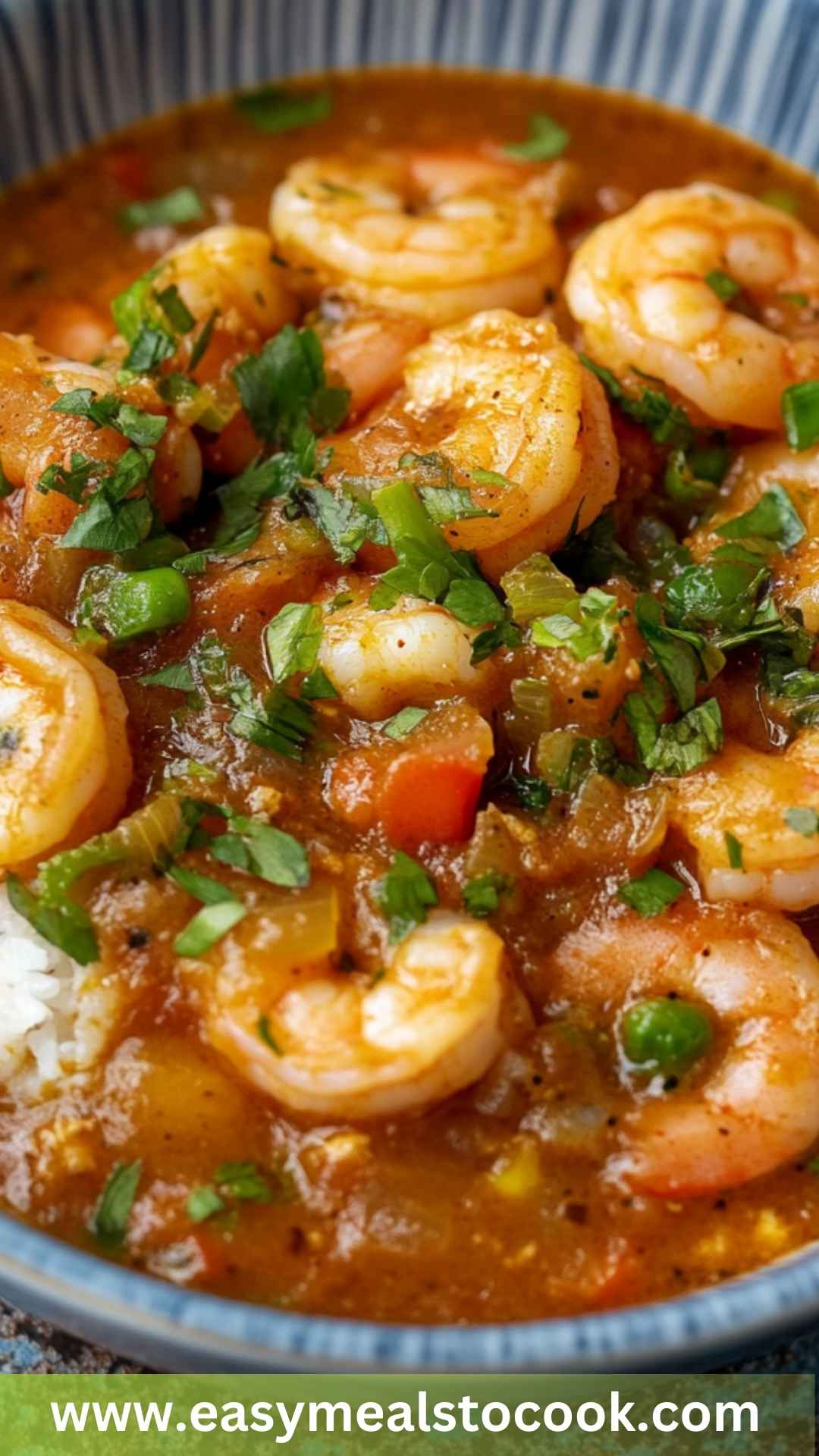
Conclusion
In the end, cooking shrimp étouffée isn’t just about following a recipe; it’s about sharing a moment, a meal, or a story. Each layer of flavor builds not only the dish but also the connections we create around our tables.
With its fusion of spices, textures, and the undeniable comfort of a home-cooked meal, shrimp étouffée deserves a spot in your culinary repertoire. So, what are you waiting for? Let’s get cooking!
You’ll also like the following recipes!
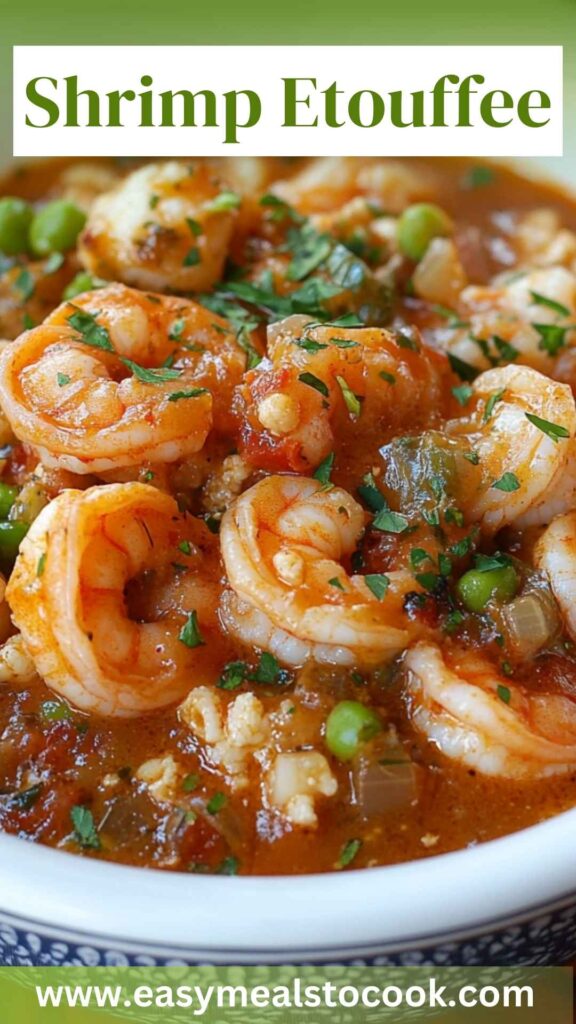
Shrimp Etouffee – Easy Meals To Cook
Description
The first time I made shrimp étouffée, I was captivated. The layers of flavor overwhelmed me in the best way possible. Growing up, my family cherished our time in the kitchen. Food was a way to bond and share stories. Today, as a registered dietitian and food blogger, I’m eager to share this classic dish with you.
With tender shrimp bathed in a rich sauce over rice, shrimp étouffée showcases the heart of Cajun cuisine. Let’s break down how anyone can create this masterpiece at home, armed with a few ingredients and some well-timed patience.
Ingredients
For the optional shrimp stock
For the étouffée
Instructions
Step 1: Prepare the Shrimp Stock (Optional)
-
If you want every nuance packed into this dish, start with making your stock. In a pot, toss together the shrimp shells, chopped onion, diced celery, garlic, bell pepper tops, bay leaves, and black peppercorns.
Cover with water, bring to a boil, and simmer for about 30 minutes. Then strain the liquid, discarding solids. That’s your secret weapon for flavor in this dish.
Step 2: Create the Roux
-
In a heavy skillet, heat the oil or lard over medium heat. Gradually whisk in the flour. The goal is to stir continuously until the mixture turns a deep brown color, resembling chocolate.
Yes, the color matters; this step builds that rich flavor. It typically takes about 15-20 minutes, so keep whisking and set your timer. The smell will be nutty and inviting.
Step 3: Incorporate the Vegetables
-
Once the roux is ready, sprinkle in the chopped onions, bell pepper, and celery aka the holy trinity. Cook this mixture, stirring frequently for about 5-7 minutes. These veggies should become soft and aromatic.
Step 4: Add Garlic and Spice
-
Add the minced garlic, jalapeños, Cajun seasoning, and paprika into the mix. Stir for an additional two minutes, letting the garlic release its fragrance and the spices bloom. This is where you can really elevate the dish’s profile.
Step 5: Pour in Liquid
-
Now, whether you’re using the homemade shrimp stock or bottled clam juice, gradually whisk it into the skillet.
This will break up any clumps of roux and create the sauce you’ll want to revel in. Bring it to a boil before reducing the heat to a simmer. Let this cook gently for about 10-15 minutes, allowing it to thicken.
Step 6: Add the Shrimp
-
Once your sauce is bubbling and savory, it’s time for the stars of the show—the shrimp. Stir them in, making sure they're well-coated with that spicy sauce.
Cook for just 5 minutes or until the shrimp are opaque and curled. (Overcooked shrimp are tough; you don’t want that!)
Step 7: Finish with Green Onions and Parsley
-
Remove the skillet from heat, then fold in the chopped parsley and green onions. Have a taste, and adjust salt and hot sauce according to your preference.
Nutrition Facts
Servings 5
- Amount Per Serving
- Calories 544kcal
- % Daily Value *
- Total Fat 17.3g27%
- Saturated Fat 10.2g51%
- Cholesterol 294mg98%
- Sodium 2333mg98%
- Total Carbohydrate 47g16%
- Dietary Fiber 4g16%
- Sugars 14g
- Protein 51g102%
* Percent Daily Values are based on a 2,000 calorie diet. Your daily value may be higher or lower depending on your calorie needs.
Note
- Use Fresh Shrimp: The fresher, the better. Always opt for quality seafood. Check for firmness and a mild ocean scent.
- Control the Heat: Not everyone enjoys heat. Adjust the number of jalapeños based on your taste. Easy does it until you find that perfect level.
- Don't Rush the Roux: Patience is key for a perfect roux. Color is everything, so keep that flame low and your whisk moving.
- Leftovers Love: Shrimp étouffée typically gets better the next day, as flavors meld together. Store in the fridge for a delightful leftover meal.
- Experiment with Spices: If you have your favorite spice blend, feel free to mix it in. Cajun seasoning adds the classic flavor, but personal touches can yield exciting results.



